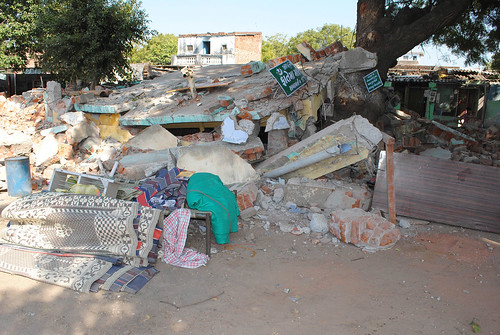By TCN News,
Ahmedabad: After winning the historic compensation case for damaged religious places of Gujarat, Islami Relief Committee, Gujarat (IRCG) has appealed to authorities of all damaged religious places in the state to approach their district principal judge for compensation as directed by the Gujarat High Court in its landmark judgment on 8th February 2012.
The High Court accepted the IRCG petition and all contentions made therein, particularly about failure and inaction on the part of the State Government, both in protecting the places of worship during the 2002 riots and payment of compensation. The court snubbed the state government for the failure and laid down a scheme for awarding compensation. The authorities of the affected religious places will have to approach the Principal District Judges of the respective districts wherein the affected damaged places of worship are situated and those judges will fix damage compensation for all cases separately.
IRCG had approached the High Court after series of representations for providing compensation or assistance for the rehabilitation of the desecrated and damaged places of worship remained unheeded.

Lone mosque on Ahmedabad-Gandhinagar highway bulldozed
In the petition IRCG had provided a list of 572 places of worship which were desecrated and damaged throughout the State during the 2002 pogrom. IRCG had contended that the said damage occurred due to inaction and failure on the part of the State to protect the affected places of worship, therefore, the loss should be compensated by the State Government. For claiming compensation IRCG had relied on the reports of National Human Right Commission, published on 1/4/2002 and 31/5/2002 and also the Annual Report of year 2002-2003, wherein NHRC recorded the failure and inaction on the part of the State Government to protect the places of worship and recommended rehabilitation of the places of worship, which the State Government accepted in principle. It was further contended that as the losses sustained by residential premises and commercial premises during the communal violence were compensated, similar treatment should also be provided to the places of worship.
The State Government did not dispute the magnitude of damage and desecration caused to the places of worship, but took stand that it is their policy decision, not to provide for compensation for places of worship, as it did not pay any compensation even after the earthquake. It was further contended that the payment of compensation would be violative of Article 27 of the Constitution of India, as the State is “Secular State”. It was also further contended that, as almost all the places of worship excluding around 37 were rehabilitated, the petition had lost its significance.
At the IRCG PIL, the High Court desired that the said issue be resolved by negotiations and pragmatic decision. Therefore, series of exchange of representations and consultations were made, but the State Government refused to accede to the request and continued with its stand of non-payment of compensation for the rehabilitation of the places of worship. Further, though the High Court orally suggested the state government to rehabilitate the remaining not rehabilitated 37 places of worships, the State Government refused to do the same also. Ultimately the High Court heard the petition on merits and gave the historic and landmark judgment on 8th Feb. 2012.
In view of the aforesaid judgment, the respective Institutions / Managements who are in charge of the affairs of respective places of worship, are required to assimilate the record, which may be available with them and collect particulars from the Authorities and on the basis thereof lodge their claims before the Principal District Judge.
Islami Relief Committee has urged the concerned institutions/managements to collect the record and particulars of the damage and the expenses for the rehabilitation and present before the Principal District Judge of their district. Since the Islami Relief Committee had provided for financial assistance for rehabilitation of many damaged places of worship, the Committee would itself lodge claim for the said places of worship. The Islami Relief Committee and other such organizations, who took active part in rehabilitation of desecrated and damaged places of worship have initiated steps and efforts.
Meanwhile, the Islamic Relief Committee has also expressed concern on the move of the state government after the High Court verdict.
“Immediately after the High Court pronounced its judgment the State Government has reportedly started collecting data from the respective Institutions / Managements managing the respective places of worship, about the damage caused and the rehabilitation undertaken, but without any prior intimation or notice. Therefore, the respective Institutions / Managements managing the respective places of worship have been taken by surprise, as without any preparation they are asked to provide details and particulars, that too after almost 10 years. Therefore, it is most earnest desire and request that at least now, the State Government may approach the issue pragmatically with a view to provide financial assistance for the damage caused in the communal violence in 2002 and not proceed with adversarial approach of fighting and contesting the claims for damages, to deprive the victims of communal violence,” the committee said in a statement.

